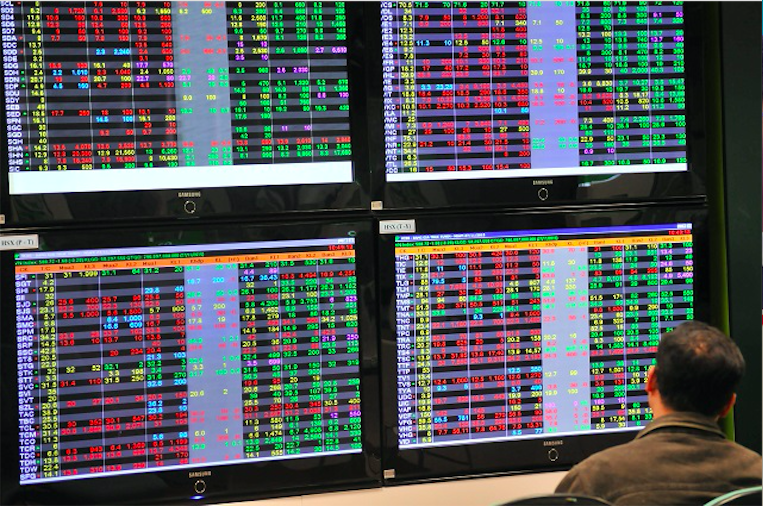Reasons why Vietnam remains world’s 4 best performing stock markets
The merging process of Hanoi and Ho Chi Minh City stock exchanges into the Vietnam Stock Exchange continues to be a priority in the coming time.
A number of reasons led to the fact that Vietnam remained fourth among the world’s best 10 performing stock markets over the last three months, according to Tran Van Dung, Chairman of the State Securities Commission of Vietnam (SSC), the country's stock market watchdog.
Chairman of the State Securities Commission of Vietnam (SSC). |
Statistics from the IndexQ website revealed Vietnam’s benchmark VN-Index rose by 11.7% as of November 6, an improvement which is thanks to Vietnam’s effective measures against the pandemic and the bright economic recovery prospect, according to Mr. Dung.
In the first 10 months of 2020, the average transaction value stood at VND6.33 trillion (US$274 million) per session, up 36% against 2019, while the figure on the bond market was estimated at VND9.86 trillion (US$426.82 million), up 7.1%.
It is worth mentioning that by the end of the first quarter, the VN-Index plunged by nearly 33% against the figure of the late of 2019, but since then, the stock market has been on a steady recovery path, Mr. Dung told Thoi Bao Tai Chinh in an interview.
For the first three quarters of 2020, Vietnam’s economic performance remains a spotlight of the region, with its trade surplus at a record high of US$17 billion and inflation under control.
Moreover, international organizations, including the World Bank or the Asian Development Bank (ADB), also provide positive assessments of Vietnam’s economic outlook with GDP growth forecast in a range of 1.6 – 3% for this year.
On the other hand, the government is pushing for greater disbursement of public funds, especially in large scale projects of high spillover effects to socio-economic development in provinces and cities.
Mr. Dung added that many local enterprises are having huge potential for development in case they could fully take advantage of the current shift of global investment capital, as well as of Vietnam’s new trade agreements such as the EU – Vietnam Free Trade Agreement (EVFTA).
Looking back at the performance of public firms in the first nine months of 2020, Mr. Dung said around 86% of those in the stock market recorded profit during the period, albeit at a slight decrease compared to the same period of last year.
Meanwhile, as Kuwait was upgraded to the Emerging Market status, Vietnam is set to benefit the most from the reclassification of the MSCI Frontier Markets Index in this November, which is a major factor attracting capital inflows from funds monitoring the Index into Vietnam’s stock market, said Mr. Dung.
| Stock market remains an attractive investment channel at present. Photo: Cong Hung. |
A recent study from Viet Dragon Securities Company (VDSC) suggested Vietnam could see a weight increase of 13 percentage points in the Frontier Markets Index to become the most important market in this index.
For the time being, foreign investors continue to be net sellers in the market, but the amount has significantly narrowed compared to the first Covid-19 outbreak in the country, noted Mr. Dung.
Other investment channels, such as savings and gold, are becoming less attractive in the eyes of investors, due to banks lowering interest rates and stagnation in the uptrend of gold prices, which are also factors that lead to more money being pumped into the stock market, he continued.
Mr. Dung also attributed the recovery of major world’s economies such as the US, China, or Europe in the third quarter to a positive performance of Vietnam’s stock market.
Steps to ensure sustainable development of Vietnam's stock market
Amid the complicated progression of Covid-19 and uncertainties surrounding the global economy, Mr. Dung noted the SSC aims to enhance the market’s resilience against external shocks.
The SSC would continue to improve the legal framework and policies for the development of the stock market, including detailed instruction on the implementation of the 2019 Securities Law, and the establishment of the long-planned Vietnam Stock Exchange from the merging of the Hanoi and Ho Chi Minh City stock exchanges.
Mr. Dung also added the authority would accelerate the realization of the project aimed at restructuring the stock and insurance markets until 2020, with vision to 2025, with the aim of ensuring the balance between the monetary and capital markets, bond and stock markets, government and corporate bond markets.
In parallel with these efforts, the SSC is determined to streamline administrative procedures to support enterprises, while maintaining discipline and order in the stock market for sustainable development.
Under Prime Minister Nguyen Xuan Phuc’s instruction, it is the priority for Vietnam’s stock market to be soon upgraded from its Frontier Market status to Emerging Market, which could be done by meeting criteria set by MSCI and FTSE.
Another priority that the SSC is looking at is to digitalize financial assets on the stock market and apply new financial technologies, standardize e-contract registration or adopt remote verification process, namely e-KYC (electronic Know-Your Customers).













